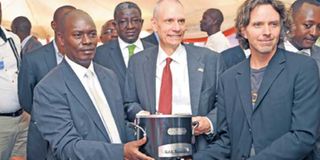Innovative project to save energy and warm pockets

Mr Peter Scott (right) displays his innovative Jikokoa to Kiambu County governor William Kabogo (left) and US ambassador to Kenya Robert Codec (centre). PHOTO | FILE
What you need to know:
- Like Mr Scott, aspiring entrepreneurs now have a chance to start their own businesses around the “clean energy stove”
- Jikokoa uses only three or two pieces of charcoal to cook for an hour
- The little jiko has a tray that collects ash and, at the same time, brings in air for combustion
Mr Peter Scott, CEO of Burn Energy, is leading the jiko revolution with his innovative Jikokoa, touted as able to reduce emissions by 61 per cent and fuel consumption by 45 per cent.
One of its kind, Jikokoa has just set up base in Kiambu County. The Sh500 million business promises to create employment and reduce harmful emissions.
Like Mr Scott, aspiring entrepreneurs now have a chance to start their own businesses around the “clean energy stove” concept in a campaign headed by the government and the United Nations.
Saving energy using viable resources puts “power at your fingertips...” the beauty of it is that you can save energy and earn a lot.
Entrepreneurs in Kenya now have an opportunity to present unique energy-saving ideas that will revolutionise the jiko to reduce the environmental and health impacts of solid fuels.
The government, in a campaign to save lives lost to harmful emissions, is working on implementing policies that will see about seven million Kenyans adopt new technology stoves by 2020.
“The policies target set projects that will scale up entrepreneur involvement in clean-cook stoves, as well as dissemination of operations,” said Environment Cabinet Secretary Judy Wakhungu.
According to Dr Isaac Kalua, the chairman of Green Africa Foundation, entrepreneurs have a chance to help stop unsustainable use of wood fuel, which depletes forest reserves that would otherwise absorb harmful gases and forestall global warming.
Mr Scott’s investment paints the picture of what and how the jiko businesses could look like.
'LITTLE CHANGES'
Jikokoa uses only three or two pieces of charcoal to cook for an hour. The little jiko has a tray that collects ash and, at the same time, brings in air for combustion. “It is these little changes that matter; the jiko is made of material that helps save energy and prevents emission of too much smoke,” said Mr Scott, adding: “It can help users save half the amount they spend on charcoal daily.”
According to the World Health Organisation, 900,000 children below five years die of pneumonia-related complications globally in a year. Most of these deaths are caused by indoor smoke in poorly ventilated homes.
The United Nations Global Alliance for Clean Cook Stoves estimates that indoor air pollution affects the lives of more than 14 million Kenyans annually.
This is because most Kenyans rely on charcoal and firewood as sources of fuel.
Mr Solomon Nzioka, the WHO Climate and Health Adaptation expert, says it is important to device new and clean ways of saving energy.
The Kenyan branch of the United Nations GACC — Kenya Alliance for Clean Cookstoves — has come up with an action plan dubbed Kenya Country Action Plan that will see more entrepreneurs take up the clean energy business.
WHO has also issued new guidelines around emissions, air quality, safety, fuel type, and climate. Households are required to take up the guidelines to curb increased deaths from harmful fuel emissions.
GACC has set aside Sh1.7 billion to fund entrepreneurs who come up with innovative technologies in energy-saving cook stoves.





